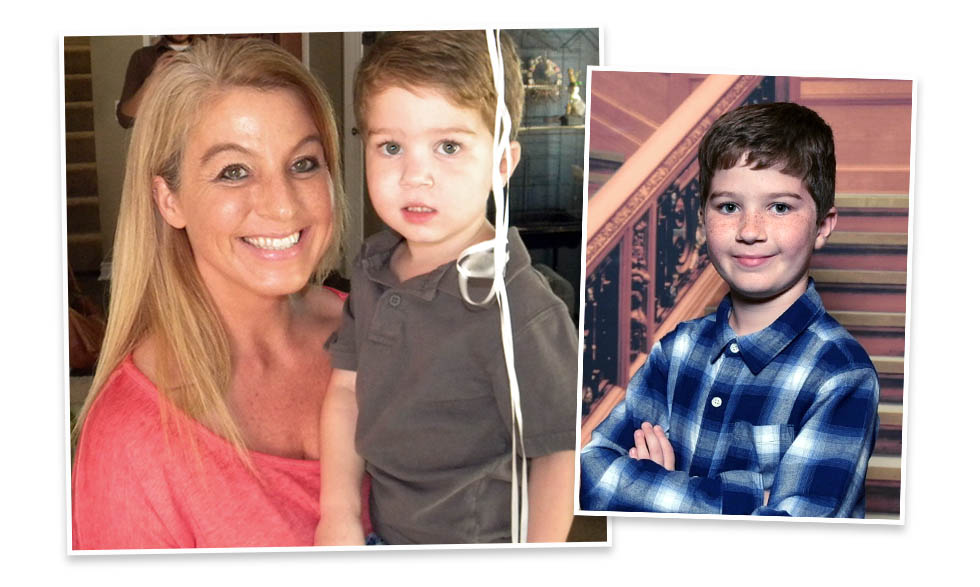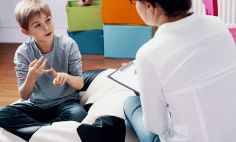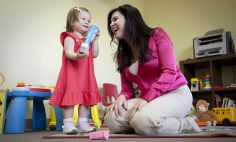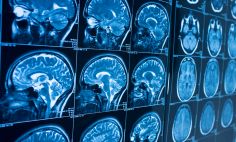Health Topics

Embracing autism diagnosis helps family take charge
Mother says sooner you know, the more tools and options you have
Luca is in fifth grade. He loves playing video games, building things, and learning about space. He can tell you the name of all of the planets and every space shuttle. Luca also has autism spectrum disorder (ASD), or autism for short.
Luca's mom, Tracy Sekhon, says autism is something that makes Luca shine—not something that holds him back. His diagnosis journey started back in 2010, when he was just 18 months old. Tracy and her husband noticed that Luca was having some developmental issues.
"Not only did he stop progressing, but he started going backwards. He had started making sounds that weren't appropriate to what he was seeing," Tracy says.
For instance, he called his dad "bye-bye" instead of "da-da."
At first, Luca's parents thought it was a problem with his hearing. It turned out he did, in fact, have a hearing issue. But after he had surgery to resolve it and then received speech therapy, some things were still not right. For instance, he wasn't responding to noises like he had previously. He also started banging his head and wouldn't respond unless someone was in front of him, Tracy recalls.
Listening to your gut
After visiting Luca's pediatrician, who told Tracy that this behavior was probably related to Luca's hearing impairment, she still wasn't convinced. Tracy and her husband did lots of research, and Tracy went back to her pediatrician. She asked for a referral to a specialist who could tell her for sure if something else was affecting her baby.
"My mommy gut was telling me there's something more going on with my son," Tracy says.
Their pediatrician recommended the University of California San Diego's (UCSD) Autism Center of Excellence in La Jolla, California, which turned out to be close to Tracy's home in San Diego. The center also focused on early autism intervention. At the center, they met with Karen Pierce, Ph.D., and other doctors.
After two days and several hours of testing, Luca was diagnosed with autism. He was 22 months old.
"We not only got a diagnosis of autism, but he was moderate to severe on the spectrum," Tracy says. "My baby had lost his speech. He had gone backwards in his development. We had lost him. It was terrifying."
After the diagnosis
Tracy quickly enrolled Luca in behavioral, speech, and occupational therapy through UCSD. She also enrolled Luca in therapy research studies, which Tracy says was a way to not only help Luca, but also to help others learn from Luca's experience.
"Educate to empower yourselves first and foremost, focus on what's possible, and make sure that you get real with the diagnosis in the very beginning."
- Tracy Sekhon
Some key steps of Luca's therapy happened outside of the UCSD center. For instance, over the course of a month, Tracy took Luca to a nearby mall for short amounts of time so he could get more comfortable in that type of social situation. She also spent a lot of time researching and asking questions.
"I just got as educated as I could, because the more I learned, the more empowered I felt and knew that I could effect change for him," Tracy says.
When Luca turned 3, he was enrolled in the California public school system and has been there ever since.
Today, he is 10 years old and learns right along with the rest of his fifth grade class. He gets some additional support in the classroom through an individual education program, but the majority of his learning takes place just as it does with his peers.
As a result of her experience, Tracy has become heavily involved in the autism community and even started her own nonprofit, Autism Resource & Treatment Center (ARTC), based in San Diego. ARTC focuses on early autism intervention and awareness, as well as teen and adult support, which Tracy says needs more attention and resources.
Empowerment through education
Looking ahead, Tracy says that Luca's early diagnosis and support have led her family to feel that while things will change, they know they have the tools to help him succeed.
"I know that through his lifetime, there will be additional challenges, but we now understand what that means," Tracy says. "It's just a matter of providing those tools. Where he is today, that is a result of all of the hard work that we did in the very beginning."
Though not all stories are like Luca's, Tracy wants people to know that early diagnosis is key to making a difference in a child's development throughout their life, not just at the time of diagnosis.
"It's easy for us as parents to look at our children and explain the challenges away because we want so badly for them to be perfect," Tracy says. "Educate to empower yourselves first and foremost, focus on what's possible, and make sure that you get real with the diagnosis in the very beginning."







